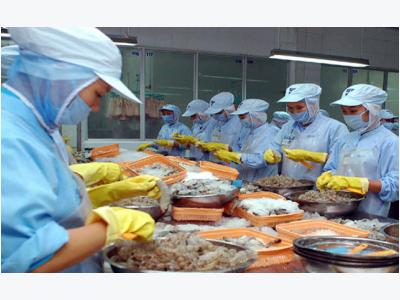Vietnams shrimp exports to be developed as national strategic product

After a year of dismal exports, Vietnam`s shrimp exports in first three quarters of 2016 has prospered with export value. Minister of Agriculture and Rural Development Nguyen Xuan Cuong has suggested developing shrimp as a national strategic product as it can contribute to agriculture growth in the rest of 2016.
Shrimp processing for exports
The shrimp sector needs to build a strong brand in the global market, he said, adding that this product has a large consumption market. In the context of climate change, Vietnam can turn challenges into advantages, he said.
The Mekong Delta needs to convert some rice growing areas into seafood breeding due to rising sea levels and increasing salinity, he explained. There is potential for shrimp products to develop under the seafood restructuring strategy, he added.
According to the Ministry of Agriculture and Rural Development, shrimp exports are likely to surpass 3 billion USD by the end of this year. Vietnam ships shrimp to 75 markets. The top 10 importers include the US, the EU, Japan, China, the Republic of Korea, Canada, Australia, ASEAN, Taiwan (China), and Switzerland, making up 95 percent of total shrimp export turnover in Vietnam.
Vietnam’s shrimp export prices are 20 percent higher than that of other foreign competitors, for instance, the average prices of Vietnamese shrimp to the US is trading at 11.2 USD per kg while China and India are selling at 6.7 and 10.8 USD per kg, respectively. Besides this, a surplus supply over demand has made the market’s competitiveness fiercer both home and aboard, Chairman of the Board of Management of Minh Phu Seafood Group Le Van Quang said.
He said shortcomings and challenges are seen in most shrimp manufacturing processes like breeding, harvesting, preservation and exports which might lead to instability, high costs and weak competitiveness for the sector. In order to cope with the situation, delegates at the conference proposed the State and relevant authorities should introduce overall measures to help the sector develop substantially, as well as increasing its competitiveness in the context of economic integration.
Vietnamese shrimp exports to the United Kingdom (UK) enjoyed remarkable growth in recent months. The Vietnam Association of Seafood Exporters and Producers (Vasep) cited the General Department of Vietnam Customs statistics showing that Vietnam earned 17.3 million USD from selling shrimp to the UK in the first two months of this year, up 38 percent from the same period last year.
In the period, the UK accounted for 4.6 percent of Vietnam’s total export turnover of shrimp. Vasep attributed the growth to the country’s increasing demand for warm-water shrimp. Statistics from the International Trade Centre (ITC) showed the price of Vietnamese shrimp in this market was about 11.5 USD per kilo, lower than that of Canada, Thailand and Bangladesh – the UK’s other main shrimp suppliers.
According to Vasep, the UK’s demand for warm-water shrimp is likely to continue rising in the remaining months of this year. Vietnam’s shrimp export turnover is expected to reach 3.3 billion USD this year, a year-on-year rise of 12 percent.
The project “Sustainable and equitable shrimp production and value chain development”, worth 2.5 million EUR, aims to promote sustainable economic prosperity and poverty reduction in Vietnam, through easing social and environmental impacts of shrimp value chain development.
According to Oxfarm Vietnam, the aquaculture sector contributes more than 3 percent to the national GDP. Shrimp production, which accounted for over 44 percent of the sector’s total output in 2015, creates jobs and incomes for about 700,000 households.
Experts recommended that the domestic shrimp sector will face a line-up of challenges such as diseases, environmental pollution and trade barriers. Shrimp production provides livelihoods for over a million of Vietnamese people and improves incomes for small scale farmers who are accounting for more than 80 percent of Vietnam shrimp production.
Related news
 Japanese seafood exporters keen to explore Vietnamese market
Japanese seafood exporters keen to explore Vietnamese market More than 30 Japanese seafood processing businesses participated in the Viet Nam-Japan trade co-operation programme organised by JETRO in HCM city on Monday
 Tra fish prices on the rise
Tra fish prices on the rise HÀ NỘI — Prices of tra fish for processing have increased in response to high demand from the Cửu Long Delta provinces.
 Seafood sector aims high despite barriers in international market
Seafood sector aims high despite barriers in international market Seafood producers and exporters have been warned that many barriers, from protectionism to media campaigns, will affect them in the international market in 2017